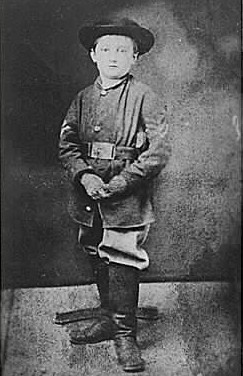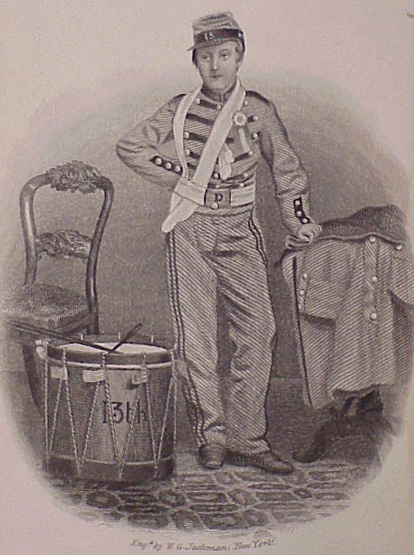In his Historical Collections of Ohio, Henry Howe tells us the story of young Johnny Clem, widely known as the drummer boy of Shiloh and quite possibly the youngest to bear arms in the American Civil War. Clem left home at the age of 11 and attempted to join the 3rd Ohio Infantry. When he was rejected due to his age and small stature, he signed on with the 22nd Michigan as a drummer boy and mascot.
As part of his research, Howe was able to interview Clem's family in Newark, Ohio. Lizzie clem, who was 7 years old when her older brother left home for the Army recalls the following events from the day prior to Johnnie's departure:
It being Sunday, May 24, 1961, and the great rebellion in progress. Johnnie said at dinner table: "Father, I'd like mighty well to be a drummer boy. Can't I go into the Union Army?" "Tut, what nonsense, boy!" "you are not ten years old." Yet when he had disappeared it is strange we had no thoughts that he had gone into the service.
When dinner was over Johnnie took charge of us, I being seven years old and our brother, Lewis, five years, and we started for the Francis de Sales Sunday-school. As it was early, he left us at the church door, saying, "I will go and take a swim and be back in time." He was a fine swimmer. That was the last we saw of him for two years.
More...The distress of our father and step-mother at Johnnie's disappearance was beyond measure. Our own mother had met with a shocking death the year before: had been run over by a yard engine as she was crossing the track to avoid another train. No own mother could be more kind to us than our step-mother. Father, thinking Johnnie must have been drowned, had the water drawn from the head of the canal. mother travelled hither and yon to find him. It was all in vain. Several weeks elapsed when we heard of him as having been in Mount Vernon; and then for two years nothing more was heard and we mourned him as dead, not even dreaming that he could be in the army, he was so very small, nothing but a child.









